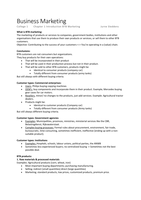Business Marketing
College 1 Chapter 1 Introduction BTB Marketing Jurne Sleddens
What is BTB marketing:
The marketing of products or services to companies, government bodies, institutions and other
organisations that use them to produce their own products or services, or sell them to other BTB
customers.
Objective: Contributing to the success of your customers <-> You’re operating in a (value) chain.
Conclusions:
BTB customers are not consumers but organizations.
They buy products for their own operations:
That will be incorporated in their product
That will be used in their production process but not in their product.
That will be sold to other BTB customers, products might be
Identical to consumer products (company car)
Totally different from consumer products (army tanks)
But still always with different buying criteria.
Customer types: Commercial enterprises:
Users, Philips buying copying machines
OEM’s, buy components and incorporate them in their product. Example; Mercedes buying
gear cases for car motors.
Resellers, minor/ no changes to the products, just add services. Example: Agricultural tractor
dealers.
Products might be:
Identical to customer products (Company car)
Totally different from consumer products (Army tanks)
But still always different buying criteria.
Customer types: Government agencies
Examples: Municipalities, provinces, ministries, ministerial services like the CBR,
Belastingdienst, Rijkswaterstaat.
Complex buying processes: Formal rules about procurement, environment, fair trade,
bureaucratic, time-consuming, sometimes inefficient, ineffective (ending up with a non-
suitable product).
Customer types: Institutions
Examples: Hospitals, schools, labour unions, political parties, the ANWB
Sometimes less experienced buyers; no centralized buying -> Sometimes not the best
possible deal.
BTB products:
1. Raw materials & processed materials
Examples: Agricultural products (corn, wheat, iron)
Most important buying departments; purchasing manufacturing.
Selling; indirect (small quantities) direct (large quantities)
Marketing; standard products, low prices, customized products, premium price.




